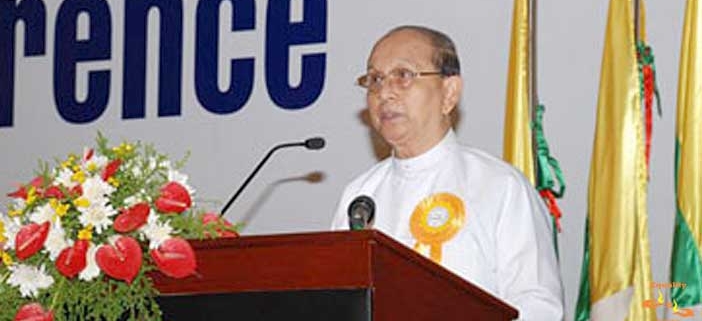Thein Sein calls for a minimum wage and worker protection
TUESDAY, 26 JUNE 2012 00:00MIZZIMA
Burmese President Thein Sein on Monday outlined the government’s focus to provide a new minimum wage and its efforts to bring economic development to average workers in rural and urban areas.
At a two-day Social Protection Conference in Naypyitaw, jointly organized by the Ministry of Social Welfare, Relief and Resettlement and Ministry of Labor and resident UNICEF officials, programs to reduce poverty and economic security were discussed.
In his speech, Thein Sein said, “The basic need of every citizen is comprehensive health care as well as income security or in other words job security. This requirement calls for opportunities such as the access to education and social security. The government has been enacting new laws, amending the existing ones and revoking out-of-date laws as necessary to promote rights of workers and farmers and holding workshops on the establishment of a universal health insurance system for low-income rural people. We are in the process of enacting a law to fix minimum wage for workers to enjoy basic social rights they deserve.”
Echoing some of the ideas stressed by Aung San Suu Kyi during her two-week European tour, which is now concluding in France, Thein Sein asked for support from international organizations including the United Nations, nongovernmental organizations, and domestic and international humanitarian organizations and he stressed the role they could play in the process of lifting up Burma’s poor and dispossessed from the bottom of the economic ladder.
He mentioned the role of “legal regulation” in ensuring economic development.
“We are taking steps to draft and enact laws to make sure the unemployed have more job opportunities and the workers effective social and security protection,” he said. “Social protection plans would not progress well without the solid support of legal regulation. We hope to acquire legal advice reflecting our country’s objective conditions from this conference.”
Thein Sein’s message to the conference, attended by high level ministers, closely paralleled some of the key points repeated by Suu Kyi throughout her travels abroad during the past two weeks and indicates that deliberations in the upcoming Parliament session may find that government ministers, lawmakers and Suu Kyi are stressing many of the same issues. How well the government and opposition lawmakers in Parliament will be able to work together in crafting legislation will be a key test in the new parliamentary session.
How to create an orderly process of legislation that accomplishes such goals in the shortest time possible will be the challenge.
No minimum wage figure was mentioned by Thein Sein in his address, but he said improvement of low-income workers wages is a priority task of the new government.
On Thursday, Mizzima reported that a bill to establish a minimum wage and benefits for private sector employees would be submitted to Parliament on July 4, according to a Parliament official.
During the recent strikes in the garment industry in Rangoon, a minimum wage and salary was drafted by the Ministry of Labour, officials told Eleven Media Group last week. Their recommendation formed the basis for the settlement of several strikes when workers accepted their offer.
“We received a bill stipulating the minimum salary and benefits for private sector employees drafted by the Ministry of Labor on 18 June,” the official was quoted as saying. “We are distributing the bill to the Hluttaw [Parliament] representatives so that they can study it for deliberation.”
In his nationwide television address last week, President Thein Sein told the country that the government is required to create jobs that pay sufficient salaries to the people.
A garment worker in a Rangoon Industrial Zone said that some workers have received a salary of around 30,000 kyat [about US$ 35], not including overtime.
An estimated 32 per cent of the Burmese population live in poverty, and Burma is the poorest country in Southeast Asia, according to some estimates.
photo : President’s office



